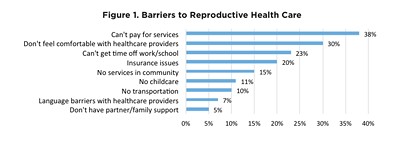Report: WHP Planned Parenthood Ban Puts Patients in Jeopardy
GWU report questions HHSC analysis of ban
By Jordan Smith, 9:38AM, Thu. May 3, 2012
Community health centers will have to expand significantly in order to compensate for the exclusion of Planned Parenthood clinics from the Women's Health Program, according to a new report released by the Geiger Gibson Program in Community Health Policy at George Washington University.
Planned Parenthood clinics across the state that provided services to WHP clients served more than 52,000 clients in 2010, the report from GWU's School of Public Health and Health Services notes, while community health centers participating in the program served just 4,000 WHP clients – meaning, in order to "offset the loss of [PP] clinics in WHP, health centers would have to expand their WHP capacity nearly 12 fold...to nearly 56,000 patients," reads the report. "Such an expansion in a short time period is virtually impossible, particularly given the simultaneous and steep loss in family planning grant funding experienced by health centers along with other family planning programs throughout the state."
The state moved to block PP from participation from the program, arguing that the clinics are nothing more than "affiliates" of abortion providers and that their participation in the program is counter to the WHP goals of expanding access to family planning healthcare and reducing the number of abortions in the state.
As of May 1, the PP clinics were officially blocked from filing for reimbursement for seeing WHP clients, leaving tens of thousands of women without access to their provider of choice. (Background on the situation here and here.)
There are approximately 1.7 million Texas women of childbearing age who may be classified as living in "medically underserved areas," reads the report, based on poverty levels, lack of health insurance, elevated health risks, and residence in an area experiencing a shortage of primary health providers. Because PP clinics are frequently located in these areas, banning PP from participation in the WHP further jeopardizes these clients' access to basic healthcare, a predicament exacerbated by lawmakers' decision last year to slash the budget typically allocated to family planning.
Moreover, the report questions the Health and Human Services Commission's analysis of what impact would be felt by the exclusion of PP from the WHP – a question also recently raised by more than two dozen state House lawmakers in a letter to HHSC Commissioner Tom Suehs. The state has noted that the more than 50,000 women left without access to a provider would be able to find an alternate provider within 2.5 miles of where they live. "The mere fact of physical proximity is simply the starting point for determining capacity," reads the report. "Furthermore, it is unclear whether HHSC used current data or relied on an older provider list including not only closed practices...but entities such as Quest Diagnostics, Lab Corp, and Center for Disease Detection, which are simply reference laboratories and do not provide direct clinical care."
Read the entire report here.
Meanwhile, the state has launched a website to help WHP clients forced to find new providers. The system is not without it's issues – including multiple listings of the same doctor or clinic, which makes it appear that there are plenty of potential providers available and ready to pick up women across the state who had chosen PP as their provider of choice.
Got something to say on the subject? Send a letter to the editor.
Read more of the Chronicle's decades of reproductive rights reporting here.
A note to readers: Bold and uncensored, The Austin Chronicle has been Austin’s independent news source for over 40 years, expressing the community’s political and environmental concerns and supporting its active cultural scene. Now more than ever, we need your support to continue supplying Austin with independent, free press. If real news is important to you, please consider making a donation of $5, $10 or whatever you can afford, to help keep our journalism on stands.
Mary Tuma, June 29, 2020
Mary Tuma, May 12, 2015
Mary Tuma, Jan. 25, 2018
Mary Tuma, March 25, 2015
May 22, 2014
Planned Parenthood, Women's Health Program, family planning, women's health, HHSC, George Washington University, public health, reproductive rights, Legislature













